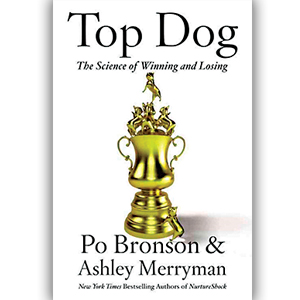
Top Dog – The Science of Winning and Losing
 When I learned that Po Bronson and Ashley Merryman had written a second book together I couldn’t wait to read it. These authors penned one of my favorite parenting books to date – Nurture Shock: New Thinking about Children. While their latest title – Top Dog: The Science of Winning and Losing – isn’t a parenting book per se, I still wanted to blog about it, as competition, perhaps now more than ever, is a hot topic when it comes to kids.
When I learned that Po Bronson and Ashley Merryman had written a second book together I couldn’t wait to read it. These authors penned one of my favorite parenting books to date – Nurture Shock: New Thinking about Children. While their latest title – Top Dog: The Science of Winning and Losing – isn’t a parenting book per se, I still wanted to blog about it, as competition, perhaps now more than ever, is a hot topic when it comes to kids.
And in some respects Top Dog was written in response to another Parenting by the Book title – Talent is Overrated by Geoff Colvin. Although I didn’t feature this title in the recent September issue, it is another one of my favorites. I found Colvin’s argument so compelling I actually incorporated his book into one of the English courses I teach at a local community college. However, in Top Dog, Bronson and Merryman refute Colvin’s claim that deliberate practice is the key to success. They argue, “In addition to the deliberate practice, success also depends on how well people compete.”
Bronson and Merryman begin their case by explaining the difference between adaptive and maladaptive competitiveness. They explain, “Adaptive competitiveness is characterized by perseverance and determination to rise to the challenge, but it’s bounded by an abiding respect for the rules.” What’s so wonderful about people who excel in adaptive competitiveness is that they “don’t have to be the best at everything – they only strive to be the best in the domain they train for.” As a result, these types of people have what Bronson and Merryman consider healthy competitiveness, marked by “constant striving for excellence but not desperate concerns for rank.”
Maladaptive competitiveness, on the other hand, is “characterized by psychological insecurity and displaced urges. It’s the person who can’t accept that losing is part of competing; it’s the person that competes when others around him are not competing.” It’s the person that wins at all costs, regardless of whether he or she is breaking the rules. These people don’t understand that cooperation is key to competition, and as a result, competition has gotten a bad rap.
Contrary to popular belief, Bronson and Merryman claim, “Competition doesn’t kill creativity: it facilitates creative output by supplying motivational drive.” Granted, they acknowledge that “what it takes to compete is not the same as what it takes to maintain well-being and to live a happy, contented life.” Still, Top Dog, through powerful anecdotes and compelling research, convincingly establishes why one would want to excel at adaptive competitiveness.
According to Bronson and Merryman, “The real benefit of competition is not winning – it is improved performance.” Competition forces people to dig a little deeper, try a little harder, and redefine their definition of best effort. Therefore, in Part Two: Formation, Bronson and Merryman look at how the worrier can ultimately beat the warrior.
Bronson and Merryman understand some people, whom they dub warriors, need stress to function at their best. This concept is probably nothing new to you, but Top Dog explains the science behind it. As a college English instructor, I often hear students say that they procrastinate because they work better under pressure. And Bronson and Merryman recognize “Some might argue that real life is full of stress, and if high-stakes tests weed out children who can’t handle the stress of performance, maybe the tests are accurately predicting who will do well in real life.”
But according to Top Dog, worriers, who typically have better memories, attention, and higher verbal IQs, actually fair better in the long run than warriors because they perform better daily and can acclimate to stressful environments over time. Therefore, there’s no need to panic if your child gets anxious during timed tests or flustered in the face of deadlines. They are not destined to fail. In fact, if you can help them realize that they are in control of how much pressure they put on themselves, they might just wear the warrior down enough to win the war.
So tune in later this month to find out more about how Bronson and Merryman upend much of the conventional wisdom on competition and get tips on how to put the odds in your child’s favor.
Follow @WinterhalterV on Twitter for updates on blog posts or like Parenting by the Book on Facebook.
Read my other blog Befriending Forty.






